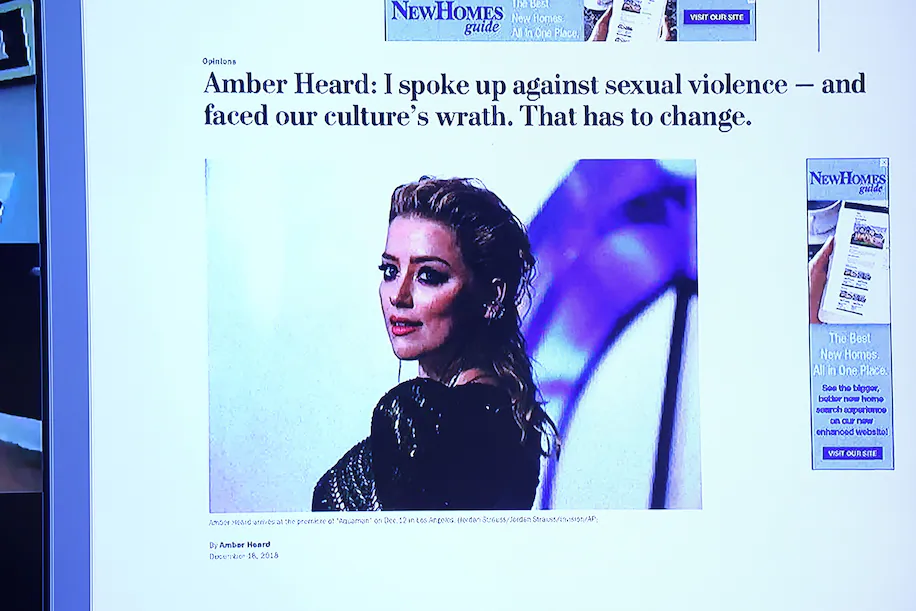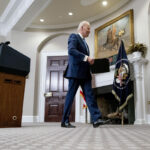FAIRFAX, Va. – Three weeks into Johnny Depp’s defamation trial in Fairfax County, which has featured days of intimate details about his tumultuous relationship with ex-wife Amber Heard, jurors on Thursday finally got to hear more about the central part of his case – Heard’s 2018 opinion piece for The Washington Post.
In one paragraph, Heard wrote: “Two years ago, I became a public figure representing domestic abuse, and I felt the full force of our culture’s wrath for women who speak out.” Depp, 58, argues that the op-ed damaged his career even though Heard did not name him; he has denied all claims of abuse and sued her for $50 million for defamation.
Heard, 36, countersued Depp for $100 million after his attorney called her allegations a hoax. Her lawyers have said the op-ed is not only true, but it’s protected by the First Amendment. The trial is taking place in Fairfax County because The Post, which is not a defendant, houses its printing press and online server in Virginia.
Video: Opening statements in Johnny Depp-Amber Heard defamation case
Jurors heard video testimony from Terence Dougherty, general counsel and chief operating officer at the American Civil Liberties Union. In 2016, following a $7 million divorce settlement with Depp, Heard said she would donate half of the money to the ACLU and half to Children’s Hospital Los Angeles, Dougherty testified. In October 2018, she became an ACLU ambassador, a title she still holds; Dougherty pointed to a page on the organization’s website that describes her as an ambassador “for women’s rights, with a focus on gender-based violence.”
Dougherty walked through the details of how the op-ed was published, as Benjamin Chew, one of the attorneys representing Depp, referred to various exhibits and documents. In November 2018, Dougherty said, an ACLU communications strategist sent an email to Heard’s publicist and others that said, “I’d like your and Amber’s thoughts on doing an op-ed in which she discusses ways in which survivors of gender-based violence have been made less safe under the Trump administration and how people can take action.”
Dougherty, who was called to testify by Depp’s lawyers, agreed with Chew that it was up to Heard’s discretion on how much personal information she wanted to share. He explained the strategist’s goal was to think of potential topics of policy importance to the ACLU that could be part of an op-ed, and how they could fit in Heard’s purview as an ambassador.
Further correspondence, Dougherty confirmed, showed that an ACLU employee met with Heard, who agreed that the ACLU communications staff members would write the first draft of the op-ed. Dougherty also confirmed that a staffer forwarded the first draft to Heard and wrote, “I tried to gather your fire and rage and really interesting analysis and shape that into an op-ed form.” Depp’s lawyer wondered whether the reference to Heard’s “rage” was about Depp’s purported abuse, though Dougherty said he interpreted it as anger about gender-based issues in general.
There was also a lot of back and forth between the ACLU and Heard’s representatives and legal team, Dougherty said. At one point, the staffer who drafted the op-ed wrote, “Your lawyers should review the way I skirted around talking about your marriage.” Dougherty, who said he did not personally see the op-ed before it was published but that it was reviewed by four ACLU lawyers, said they wanted to be careful that nothing put Heard in jeopardy of violating a nondisclosure agreement that she signed in her divorce settlement with Depp.
Depp’s lawyer, Chew, asked whether it was true that Heard’s team revised the draft to remove references to Heard’s marriage or divorce, and Dougherty recalled there were a number communications between the ACLU and Heard’s attorneys suggesting edits relating to matters covered in the NDA. Dougherty agreed with Chew that some at the ACLU expressed that removing the references to Heard’s marriage to Depp would make the op-ed “less impactful,” but said he did not recall that Heard pushed to get that material back in.
The ACLU took the responsibility of placing the op-ed, Dougherty said, and after a conversation with Heard, the communications strategist suggested they pitch the piece to the New York Times, Washington Post, Teen Vogue and USA Today. There was also a discussion about timing it to the December 2018 release of “Aquaman,” starring Heard alongside Jason Momoa.
Heard was about to receive “an incredible amount of press” in the public eye, Dougherty pointed out, so for the ACLU, there was no better time to put out the op-ed to a significant readership to learn about the organization’s causes. Dougherty said he believed that Heard’s public relations team was involved in conversations on timing.
An ACLU staffer reached out to several opinion editors at The Post, Dougherty said, and The Post agreed to publish the piece. Depp’s lawyer asked about the online version’s headline (“Amber Heard: I spoke up against sexual violence – and faced our culture’s wrath. That has to change.”) Dougherty said he was unaware whether the ACLU had any role in writing it.
Depp’s lawyer brought up an email from an ACLU staffer that referenced a subsequent USA Today article about the op-ed that tied Heard’s statements to Depp, and the staffer wrote, “So much for not mentioning JD.” Dougherty speculated this meant that there were “significant efforts” made by Heard’s lawyers to take out references to her marriage, but people made the connection anyway.
During Dougherty’s testimony, there was much back and forth about Heard’s pledge to donate half of her divorce settlement – $3.5 million – to the ACLU. An initial proposed payment plan in 2016 said that Heard would donate $350,000 every year, though according to documents, Heard has only donated $1.3 million total so far; Dougherty said the last payment they received was near the end of 2018, and then they became aware that Heard was having financial difficulties.
Dougherty said Heard made a payment of $350,000; Depp made a payment on her behalf for $100,000; Heard then made another payment for $350,000 through a donor-advised fund; and $500,000 came from another donor-advised fund on Heard’s behalf, which Dougherty said his staff believes came from Tesla CEO Elon Musk, whom Heard dated after she split from Depp.
During a brief cross-examination, Heard’s lawyer Elaine Bredehoft pointed out there’s no evidence to suggest that Heard does not intend to pay the full amount, and Dougherty agreed that there is no indication that Heard has decided to discontinue her donations.
Related Content
During this year’s Ramadan, many Muslims can finally gather in person
A shelter in Ukraine saved hundreds of cats and dogs – and a lion
Ukrainian reservists shift from civilian life to war zone battlefields




